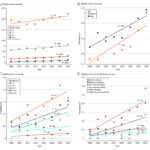Introduction
Advancements in artificial intelligence (AI) are paving the way for more effective and personalized cancer treatments. Researchers have developed an AI platform that customizes protein components to enhance the body’s immune response against cancer. This innovative approach, recently published in the journal Science, reduces the time needed to identify effective treatment molecules from years to mere weeks.

Revolutionizing Cancer Immunotherapy
The AI platform marks a significant shift in cancer immunotherapy by addressing the challenge of designing targeted treatments for tumor cells while sparing healthy tissue. Normally, T cells identify cancer cells through specific protein fragments, or peptides, displayed on the cell surface by pMHC molecules. However, the traditional approach of finding suitable T-cell receptors is labor-intensive and time-consuming. By creating molecular keys through AI, researchers can now design proteins that efficiently target cancer cells, reducing the lead time to just 4-6 weeks.
“We are essentially creating a new set of eyes for the immune system,” explains Timothy P. Jenkins, Associate Professor at the Technical University of Denmark (DTU) and senior author of the study.
Targeted Cancer Therapy
The research team, comprising experts from DTU and the American Scripps Research Institute, has developed an AI platform that generates targeted treatments for cancer cells. This method not only speeds up the process but also minimizes potential damage to healthy tissue.
In their study, the researchers focused on a known cancer target, NY-ESO-1, which is prevalent in various cancers. They successfully designed a minibinder protein that binds tightly to NY-ESO-1 pMHC molecules. When integrated into T cells, this designed protein created a new cell product named ‘IMPAC-T’ cells, effectively directing T cells to destroy cancer cells in laboratory settings.
“It was incredibly exciting to take these minibinders, which were created entirely on a computer, and see them work so effectively in the laboratory,” says Kristoffer Haurum Johansen, a co-author of the study and researcher at DTU.
Ensuring Safety and Effectiveness
A pivotal part of the researchers’ innovation is the ‘virtual safety check’ enabled by AI. This screening process evaluates the designed minibinders against pMHC molecules in healthy cells, filtering out those that could cause harmful side effects before testing begins.
“Precision in cancer treatment is crucial,” notes Sine Reker Hadrup, DTU professor and co-author. “By predicting and ruling out cross-reactions already in the design phase, we were able to reduce the risk associated with the designed proteins and increase the likelihood of designing a safe and effective therapy.”
Looking Ahead
Timothy P. Jenkins anticipates that it will take approximately five years for this method to reach initial clinical trials in humans. Once ready, the process will resemble current cancer treatments using genetically modified T cells, such as CAR-T cells, which are employed to treat lymphoma and leukemia.
Patients will undergo a procedure similar to a routine blood test, where their immune cells are extracted from the blood sample and modified in the lab with AI-designed minibinders. These enhanced immune cells are then reintroduced to the patient, acting as precision-targeted missiles to locate and eliminate cancer cells within the body.
This breakthrough in AI-designed protein therapy promises to transform personalized cancer treatment, offering hope for faster, safer, and more effective solutions in the fight against cancer.
Johansen, K. H., et al. (2025) De novo-designed pMHC binders facilitate T cell–mediated cytotoxicity toward cancer cells. Science. doi.org/10.1126/science.adv0422 IF: 45.8 Q1


